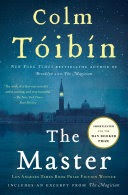The Magician Disappeared
- Gail Wilson Kenna
- Aug 11
- 2 min read
How could I have returned home last Thursday from the RCC-RILL book club without the novel we discussed? Namely, Colm Tóibín’s The Magician. Now this early Sunday evening, I sit here without the book I underlined and commented on during three readings of it. Onward, I tell myself.

Last Thursday one book club member admitted to a change of attitude regarding fiction about real persons. She had not been converted by the earlier Tóibín novel we read: The Master about Henry James. Yet Tóibín’s depiction of Thomas Mann made her a convert. That same day she went home and sent me the link to a You Tube interview with Tóibín from the Edinburgh Festival. It was one I had not seen and heard.
I appreciated this interview because this delightful Irish writer talked about The Magician’s POV ( point of view ).

Although Tóibín did not discuss The Master, I will note that his novel about Henry James covers 1895-1899. Throughout this four-year time frame, Tóibín weaves in the life of James from his youth and earlier adulthood. The novel’s narration in third person reflects the complexity and eloquence of the Henry James style. I admire this novel and gained a greater appreciation of James from reading it. Yet I was not enthralled with The Master the way I was with The Magician, as if hypnotized.
Tóibín’s discussion made me understand why I felt this way. In The Magician he created an intimate third person narration without any intrusion from the author. The character, Thomas Mann, has no foreknowledge of anything that happens, such as wars. This is to say the backstory that characterized The Master is absent from The Magician. This novel is narrated in chronological order from Lübeck in 1891 to Lübeck in 1955, the year of Mann’s 80th birthday, when he and wife Katia (and some of the six Mann children) lived in Switzerland.
Last week I used the word “voyeur” to describe how I felt reading about Thomas Mann’s public life and his private one. Tóibín takes the reader into whatever room or place Thomas is in. We see the world as he does. And by Tóibín’s own admission, he cut 55,000 words from the novel. Can that figure be correct? He also cited a famous line from Henry James about the three most important words for writing fiction. Dramatize, repeated three times. Which is what Mann has done in The Magician.
I will end today’s blog with four lines from the British-American poet, W.H. Auden. He was married to Erica Mann in a passport marriage, as it were. These lines reflect Thomas Mann.
The Writer fetches/the images out/that hurt and connect/from life to art.
Next week: Mann’s remarkable novella, Death in Venice





Comments